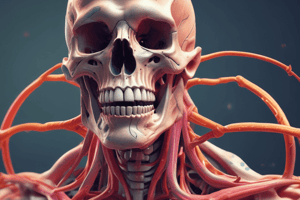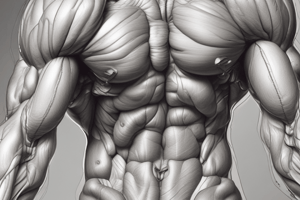Podcast
Questions and Answers
What happens to the length of the filaments during muscle contraction?
What happens to the length of the filaments during muscle contraction?
- The length of both thin and thick filaments remains the same (correct)
- The thin filaments shorten, while the thick filaments lengthen
- The length of both thin and thick filaments increases
- The thick filaments shorten, while the thin filaments lengthen
What is the role of the myosin head in muscle contraction?
What is the role of the myosin head in muscle contraction?
- It binds to the thin filament and helps to pull it towards the center of the sarcomere (correct)
- It binds to the thick filament and helps to shorten it
- It adheres to the tails of other myosin molecules
- It cleaves ATP and releases energy for muscle contraction
What is the energy source for muscle contraction?
What is the energy source for muscle contraction?
- The energy generated from the shortening of the thick filaments
- The energy produced from the binding of myosin to actin
- The energy stored in the actin filaments
- The energy released from the hydrolysis of ATP (correct)
What is the function of the myosin tail?
What is the function of the myosin tail?
What is the result of the hydrolysis of ATP bound to the myosin head?
What is the result of the hydrolysis of ATP bound to the myosin head?
What is required for muscle contraction?
What is required for muscle contraction?
What is the main purpose of the myosin molecule's tail region?
What is the main purpose of the myosin molecule's tail region?
During muscle contraction, what happens to the position of the thin filament relative to the center of the sarcomere?
During muscle contraction, what happens to the position of the thin filament relative to the center of the sarcomere?
What is the result of the myosin head returning to its low-energy form?
What is the result of the myosin head returning to its low-energy form?
What is the purpose of the cycles of binding and release in muscle contraction?
What is the purpose of the cycles of binding and release in muscle contraction?
What is the role of the globular 'head' region of the myosin molecule?
What is the role of the globular 'head' region of the myosin molecule?
What is the mechanism by which the thick and thin filaments slide past each other during muscle contraction?
What is the mechanism by which the thick and thin filaments slide past each other during muscle contraction?
What is the apparent paradox that the sliding-filament model of muscle contraction explains?
What is the apparent paradox that the sliding-filament model of muscle contraction explains?
What is the role of the globular 'head' region of the myosin molecule in the sliding-filament model?
What is the role of the globular 'head' region of the myosin molecule in the sliding-filament model?
What is the result of the binding of a new ATP molecule to the myosin head?
What is the result of the binding of a new ATP molecule to the myosin head?
What is the function of ATP in the sliding-filament model of muscle contraction?
What is the function of ATP in the sliding-filament model of muscle contraction?
What is the net result of the ratcheting of the thin and thick filaments past each other?
What is the net result of the ratcheting of the thin and thick filaments past each other?
What is the relationship between the myosin molecules and the thick filament?
What is the relationship between the myosin molecules and the thick filament?
What is the primary function of the myosin molecule's 'head' region in muscle contraction?
What is the primary function of the myosin molecule's 'head' region in muscle contraction?
What is the result of the myosin head returning to its low-energy form during muscle contraction?
What is the result of the myosin head returning to its low-energy form during muscle contraction?
What is the purpose of the repeated cycles of binding and release in muscle contraction?
What is the purpose of the repeated cycles of binding and release in muscle contraction?
What is the role of the thick filament in the sliding-filament model of muscle contraction?
What is the role of the thick filament in the sliding-filament model of muscle contraction?
What is the energy source that powers the ratcheting of the thick and thin filaments past each other during muscle contraction?
What is the energy source that powers the ratcheting of the thick and thin filaments past each other during muscle contraction?
What happens to the thin filament during muscle contraction?
What happens to the thin filament during muscle contraction?
What is the primary function of creatine phosphate in muscle contraction?
What is the primary function of creatine phosphate in muscle contraction?
During light or moderate muscle activity, how is glucose metabolized?
During light or moderate muscle activity, how is glucose metabolized?
What is the duration of muscle contraction sustained by creatine phosphate?
What is the duration of muscle contraction sustained by creatine phosphate?
During intense muscle activity, how is ATP generated?
During intense muscle activity, how is ATP generated?
What is the primary source of energy for muscle contraction during intense activity?
What is the primary source of energy for muscle contraction during intense activity?
How long can muscle contractions be sustained by the resting supply of creatine phosphate?
How long can muscle contractions be sustained by the resting supply of creatine phosphate?
What is the metabolic process that generates power to sustain contractions for nearly an hour?
What is the metabolic process that generates power to sustain contractions for nearly an hour?
What is the source of ATP during intense muscle activity?
What is the source of ATP during intense muscle activity?
What is the purpose of glycogen breakdown in muscle contractions?
What is the purpose of glycogen breakdown in muscle contractions?
What is the product of the reaction where a phosphate group is transferred from creatine phosphate to ADP?
What is the product of the reaction where a phosphate group is transferred from creatine phosphate to ADP?
Flashcards are hidden until you start studying
Study Notes
The Sliding-Filament Model of Muscle Contraction
- A contracting muscle shortens, but the filaments that bring about contraction stay the same length.
- The sliding-filament model explains this paradox, where thin and thick filaments ratchet past each other, powered by myosin molecules.
Structure of Myosin Molecule
- Each myosin molecule has a long "tail" region and a globular "head" region.
- The tail adheres to the tails of other myosin molecules, binding together the thick filament.
- The head, jutting to the side, can bind ATP.
Cycles of Change in Myosin Molecule
- Hydrolysis of bound ATP converts myosin to a high-energy form that binds to actin, forming a cross-bridge between the myosin and the thin filament.
- The myosin head then returns to its low-energy form as it helps to pull the thin filament toward the center of the sarcomere.
- When a new ATP molecule binds to the myosin head, the cross-bridge is disrupted, releasing the myosin head from the actin filament.
Muscle Contraction Requirements
- Muscle contraction requires repeated cycles of binding and release.
- During each cycle of each myosin head, the head is freed from a cross-bridge, cleaves the newly bound ATP, and binds again to actin.
ATP Storage and Replenishment
- At rest, most muscle fibers contain only enough ATP for a few contractions.
- Powering repetitive contractions requires two other storage compounds: creatine phosphate and glycogen.
- Transfer of a phosphate group from creatine phosphate to ADP in an enzyme-catalyzed reaction synthesizes additional ATP.
- ATP stores are also replenished when glycogen is broken down to glucose.
- During light or moderate muscle activity, glucose is metabolized by aerobic respiration, yielding enough power to sustain contractions for nearly an hour.
- During intense muscle activity, oxygen becomes limiting and ATP is instead generated by lactic acid fermentation, sustaining contraction for only about 1 minute.
Studying That Suits You
Use AI to generate personalized quizzes and flashcards to suit your learning preferences.




